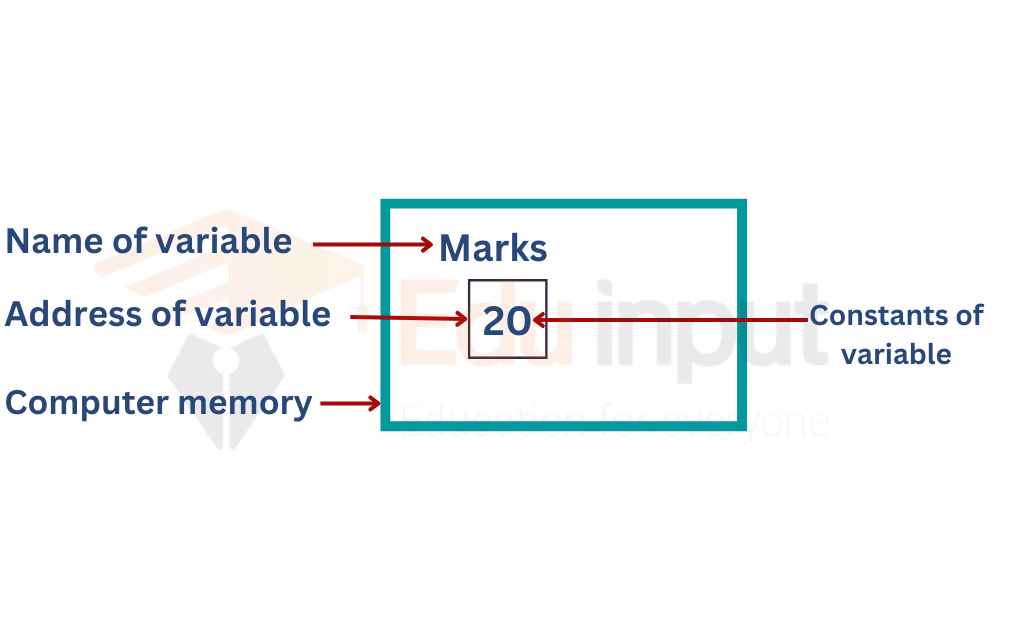Variable in C Language–Variable Declaration, And Variable Initialization
A variable is a named memory location that stores data and results during a program’s execution. The variable’s value can change during the program, but the variable’s name cannot.
Variables are created in RAM, which is temporary memory storage. That means that the data stored in variables is also temporary and can only be accessed and used during the program’s execution. When the program ends, the data stored in the variable is automatically deleted.

Name of variable: An identifier is a way to represent a memory location.
Address of variable: It refers to the memory location of the variable.
Contents of variable: The value stored in a memory location referred to by a variable.
Variable Declaration
Designating a variable name and its corresponding type is referred to as variable declaration. A program can have as many variables as it requires. C language employs strict typing, meaning all variables must be declared prior to use in the program. A variable can be declared at any point in the program before its initial use.
Variable declarations give the compiler information about what the variable is being used for. The compiler then uses this information to determine how much memory is needed to store the variable. Different data types require different amounts of memory.
For example, an int variable requires 2 bytes, whereas a character variable only requires 1 byte. When a variable is declared, the required number of bytes is allocated in order to store the value of that variable.
Once a variable is declared, its data type cannot be changed during program execution However, the value of the variable can be changed during execution.
Syntax
The syntax of declaring variables is as follows
Data type variable_name;
Data-type
It indicates the type of data that can be stored in a variable.
Variable-name
It refers to the memory location of the variable.
Examples
Difference types of variables are declared as follows:
int marks;
Float average;
Char grade;
double salary;
In the above examples int, float, char, and double are keywords that indicate data types. The words marks, average, grade, and salary are variable names.
Many variables of the same data type can also be declared in a single line. Each variable name is separated by a comma as follows:
int a, b, c;
Variable Initialization
The process of giving a value to a variable when you first create it is called variable initialization. To do this, we use the equal sign = . The variable’s name always goes on the left side of the = , and the value goes on the right.
The compiler will automatically assign memory for the variable during its declaration. However, the memory location may contain some data that is irrelevant to the program. This data is known as garbage value. It can produce anomalous results in some computations. All variables should be initialized to prevent this problem.
Syntax
The syntax of initializing a variable is as follows:
type – name variable = value;
type – name it indicates the data type of the variable to be initialized.
Variable: It is the assignment operator used to initialize a variable.
= it is the assignment operator used to initialize a variable.
Value. It is the value to initialize a variable.
Example
Some examples of variable initialization are as follows:
int n = 100;
int x = 50, y = 75;
Related FAQs
What is the variable in C and the rules?
A variable can be made up of letters, numbers, and underscores. A variable name can start with a letter or an underscore. It cannot start with a number. Whitespace is not allowed within the variable name. Additionally, the variable name cannot be a reserved word or keyword, such as int or goto.
What is the variable syntax?
The syntax can be defined as the grammar of a programming language. this simply means the way in which code is written in a specific language. We can break down syntax even further and talk about the syntax of a small part of a program, such as the syntax of variable declaration.
How do you declare variables in C?
It’s important to remember that variables shouldn’t be declared with the same name in the same scope. A variable name can start with anything like the alphabet and underscore, but it must not be a reserved keyword in C.
Additionally, a variable name can contain any combination of alphabets, numbers, and underscore. By following these simple rules, you can avoid potential issues down the line!







Leave a Reply